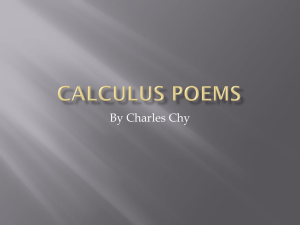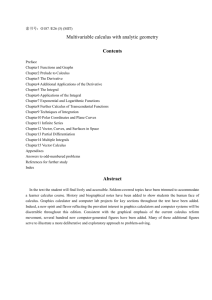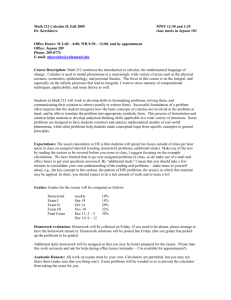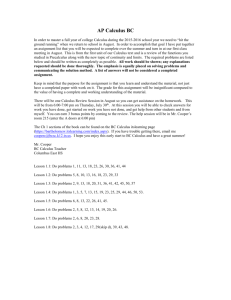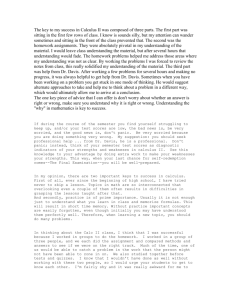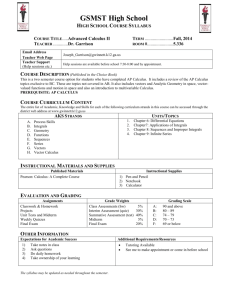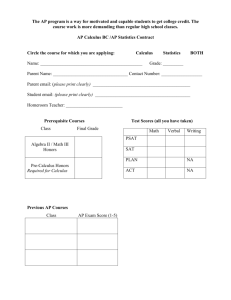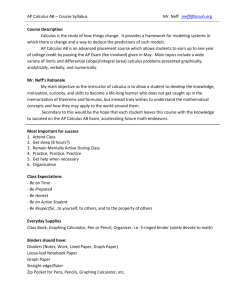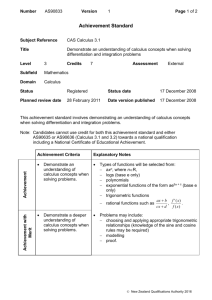VERSION 1 FINAL EXAMINATION
advertisement
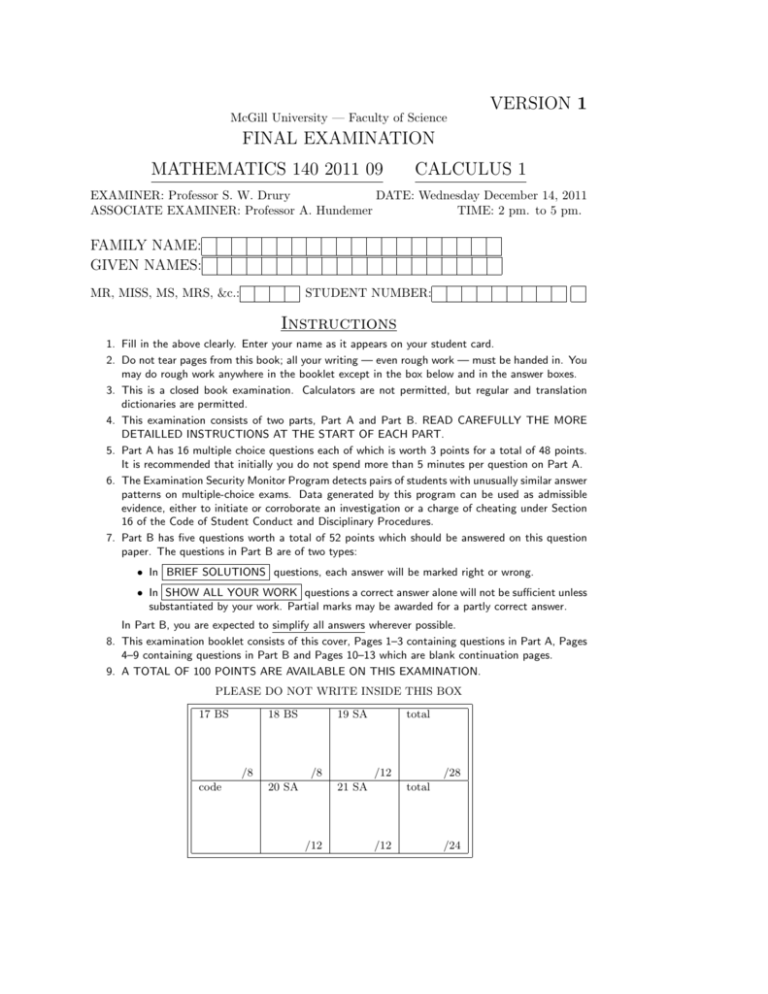
McGill University — Faculty of Science VERSION 1 FINAL EXAMINATION MATHEMATICS 140 2011 09 CALCULUS 1 EXAMINER: Professor S. W. Drury DATE: Wednesday December 14, 2011 ASSOCIATE EXAMINER: Professor A. Hundemer TIME: 2 pm. to 5 pm. FAMILY NAME: GIVEN NAMES: MR, MISS, MS, MRS, &c.: STUDENT NUMBER: Instructions 1. Fill in the above clearly. Enter your name as it appears on your student card. 2. Do not tear pages from this book; all your writing — even rough work — must be handed in. You may do rough work anywhere in the booklet except in the box below and in the answer boxes. 3. This is a closed book examination. Calculators are not permitted, but regular and translation dictionaries are permitted. 4. This examination consists of two parts, Part A and Part B. READ CAREFULLY THE MORE DETAILLED INSTRUCTIONS AT THE START OF EACH PART. 5. Part A has 16 multiple choice questions each of which is worth 3 points for a total of 48 points. It is recommended that initially you do not spend more than 5 minutes per question on Part A. 6. The Examination Security Monitor Program detects pairs of students with unusually similar answer patterns on multiple-choice exams. Data generated by this program can be used as admissible evidence, either to initiate or corroborate an investigation or a charge of cheating under Section 16 of the Code of Student Conduct and Disciplinary Procedures. 7. Part B has five questions worth a total of 52 points which should be answered on this question paper. The questions in Part B are of two types: • In BRIEF SOLUTIONS questions, each answer will be marked right or wrong. • In SHOW ALL YOUR WORK questions a correct answer alone will not be sufficient unless substantiated by your work. Partial marks may be awarded for a partly correct answer. In Part B, you are expected to simplify all answers wherever possible. 8. This examination booklet consists of this cover, Pages 1–3 containing questions in Part A, Pages 4–9 containing questions in Part B and Pages 10–13 which are blank continuation pages. 9. A TOTAL OF 100 POINTS ARE AVAILABLE ON THIS EXAMINATION. PLEASE DO NOT WRITE INSIDE THIS BOX 17 BS 18 BS /8 code 19 SA /8 20 SA total /12 21 SA /12 /28 total /12 /24 Calculus 1 MATH 140 Final Exam Version 1 Part A: MULTIPLE CHOICE QUESTIONS Each of the following 16 questions is worth 3 points. Three quarters of a point will be subtracted for each wrong answer. The maximum number of points you may earn on these multiple choice questions is 48 points. There is only one correct answer expected for each question. The questions are to be answered on the answer card provided. Be sure to enter on the answer card: ◦ Your student number. ◦ Your name. ◦ The check code, i.e. the first two letters of your family name. Fill in the disks below your student number, check code and verify that the marked version number matches the version number on the question paper. If it does not, please notify an invigilator. It is recommended that initially you do not spend more than 5 minutes per question on Part A. 1. (3 points) x2 + x − 6 x→2 x2 − x − 2 Find lim (a) 2. (3 points) 5 , 3 (c) 6, (d) 0, (b) 1, (c) 0, (d) (e) 2 . 3 (x + 2)2 x→1 x + 8 Find lim (a) 6, 3. (3 points) (b) 3, 2 , 3 (e) 3. 3ex + 5 . x→∞ ex + 1 Find lim (a) 2 , 3 (b) 4, (c) 3, (d) 5, (e) does not exist. √ 4. (3 points) (a) x = 0, 5. (3 points) The vertical asymptote(s) of f (x) = (b) x = 3, (c) x = 1, 1 4x4 + 9 is (are) best described by x2 + x − 2 (d) two asymptotes, (e) no asymptotes. 2 Let f (x) = −3x 4 − 7x− 5 . Find f 0 (1). (a) 1, (b) 21 , 10 (c) − 13 , 5 1 (d) 11 , 3 (e) 41 . 20 Calculus 1 MATH 140 Final Exam Version 1 6. (3 points) The equation y sinh(x) + x cosh(y) = 1 defines y as a function of x near dy (x, y) = (1, 0). Find at x = 1. dx (a) − 7. (3 points) 2e , e2 − 1 (b) 2e , e2 − 1 (c) 1, (d) 2e , e2 + 1 (e) 0. Let the function be defined by if x < 0, cosh(x) f (x) = a − 4 cos(x) if x ≥ 0. is continuous everywhere provided that a equals (a) 4, 8. (3 points) Let f (x) = (b) -2, (c) 0, (b) 1, (c) 15 , The tangent to the curve y = (x, y) = (a) (2, −7), 11. (3 points) (d) 1, (d) 4, (b) (3, −12), (d) 14 , (e) 2. (e) 31 . (x − 2)2 at (−1, 3) passes through the point x+4 (c) (−3, 12), (d) (1, −5), The maximum value attained by the function [−12, −6] is (a) −16, 12. (3 points) (e) 5. sin(x) . Find f 0 (0). x2 − 3x + 4 (a) − 15 , 10. (3 points) (c) −1, Let f (x) = x2 ex + 2(x + 1)3 e−x . Find f 0 (0). (a) 1, 9. (3 points) (b) 0, (b) −20, (c) 0, (d) −36, The maximum value attained by the function is (a) 1, (b) 1 , 5 (c) 2 2 , 5 (d) 0, (e) (−2, 6). (x − 2)2 on the interval x+4 (e) −24. (x − 2)2 on the interval [0, 5] x+4 (e) 2. Calculus 1 MATH 140 Final Exam 13. (3 points) Version 1 Let f (x) = 2 sin(x) − cos(2x). Then f 00 √ (a) 1, 14. (3 points) (b) 0, (c) 3 , 2 (d) ³π ´ 6 √ 3, is (e) −1. 4 The set on which the function f (x) = |x| 3 (7 − x) is increasing is (a) (−∞, 4], (b) (−∞, 0], 7 (c) [0, ], 4 (d) [0, ∞), (e) [0, 4]. 15. (3 points) Let f (x) = 4x3 + 5x2 − 4x + 2. The Intermediate Value Theorem applied to f on the interval [−2, 1], can be used to establish the existence of a number x0 satisfying −2 < x0 < 1 and such that f (x0 ) equals (a) 5, (b) 8, (c) 10, (d) 12, (e) −3. 16. (3 points) Let f (x) = 4x3 + 5x2 − 4x + 2. The Mean Value Theorem applied to f on the interval [−2, 1], yields the existence of a number x0 satisfying −2 < x0 < 1 and such that f 0 (x0 ) equals (a) 3, (b) −1, (c) 1, 3 (d) 4, (e) 0. Calculus 1 MATH 140 Final Exam Version 1 Part B: ANSWER DIRECTLY ON THE QUESTION PAPER In Part B there are 5 questions worth a total of 52 points. In Part B, you are expected to simplify all answers wherever possible. The questions in Part B are of two types: • In BRIEF SOLUTIONS questions worth 8 points each, each answer will be marked right or wrong. For these questions start your rough work below the answer box and use the facing page if necessary. • In SHOW ALL YOUR WORK questions worth 12 points each, a correct answer alone will not be sufficient unless substantiated by your work. Partial marks may be awarded for a partly correct answer. Begin your solution on the page where the question is printed. You may continue a solution on the facing page, or on the continuation pages, or the back cover of the booklet, but you must indicate any continuation clearly on the page where the question is printed! Write your final answer in the answer box provided. 4 Calculus 1 MATH 140 Final Exam Version 1 17. (8 points) BRIEF SOLUTIONS Find all critical points of the function f (x) = sin(x) − (x − π) cos(x) 3π 5π in the interval − <x< . 2 2 ANSWER ONLY (4 points) Classify each such point as a local minimum, a local maximum or some other kind of critical point. ANSWER ONLY (4 points) 5 Calculus 1 MATH 140 Final Exam 18. (8 points) function Version 1 BRIEF SOLUTIONS Find the first derivative and second derivative of the f (x) = (3x2 − 10x + 6)ex . ANSWER ONLY (1 point) ANSWER ONLY (1 point) f 0 (x) = f 00 (x) = Determine where the function is increasing and decreasing. ANSWER ONLY (3 points) Determine where the function is concave up and concave down. ANSWER ONLY (3 points) 6 Calculus 1 MATH 140 Final Exam Version 1 19. (12 points) SHOW ALL YOUR WORK! The surface area of a spherical balloon is increasing at a constant rate of 40 square centimetres per minute. At what rate is its volume increasing when the radius is 25 centimetres. Note that the surface area of a sphere of radius r centimetres is 4πr2 square centimetres and its volume is 43 πr3 cubic centimetres. ANSWER ONLY (12 points) 7 Calculus 1 MATH 140 Final Exam 20. (12 points) Version 1 SHOW ALL YOUR WORK! Find lim x→π ANSWER ONLY (12 points) 8 (x − π) sin(x) . 1 + cos(x) Calculus 1 MATH 140 Final Exam Version 1 21. (12 points) SHOW ALL YOUR WORK! A cylindrical barrel with a circular base of radius r feet is to have a volume of V cubic feet. Note that the area of the base is πr2 square feet. The material for the top and bottom of the barrel costs $5 per square foot and that for the sides cost $3 per square foot. Write down a formula for the total cost $C for the barrel in terms of r and V . ANSWER ONLY (4 points) C= Assuming that V is a constant, write down an equation relating r and V that will be satisfied when r is chosen so as to minimize C. ANSWER ONLY (4 points) If the height of the barrel is h feet, find the quotient ANSWER ONLY (4 points) 9 h in this minimal cost configuration. r Calculus 1 MATH 140 Final Exam Version 1 continuation page for problem number You must refer to this continuation page on the page where the problem is printed! 10 Calculus 1 MATH 140 Final Exam Version 1 continuation page for problem number You must refer to this continuation page on the page where the problem is printed! 11 Calculus 1 MATH 140 Final Exam Version 1 continuation page for problem number You must refer to this continuation page on the page where the problem is printed! 12 Calculus 1 MATH 140 Final Exam Version 1 continuation page for problem number You must refer to this continuation page on the page where the problem is printed! 13 McGill University — Faculty of Science VERSION 2 FINAL EXAMINATION MATHEMATICS 140 2011 09 CALCULUS 1 EXAMINER: Professor S. W. Drury DATE: Wednesday December 14, 2011 ASSOCIATE EXAMINER: Professor A. Hundemer TIME: 2 pm. to 5 pm. FAMILY NAME: GIVEN NAMES: MR, MISS, MS, MRS, &c.: STUDENT NUMBER: Instructions 1. Fill in the above clearly. Enter your name as it appears on your student card. 2. Do not tear pages from this book; all your writing — even rough work — must be handed in. You may do rough work anywhere in the booklet except in the box below and in the answer boxes. 3. This is a closed book examination. Calculators are not permitted, but regular and translation dictionaries are permitted. 4. This examination consists of two parts, Part A and Part B. READ CAREFULLY THE MORE DETAILLED INSTRUCTIONS AT THE START OF EACH PART. 5. Part A has 16 multiple choice questions each of which is worth 3 points for a total of 48 points. It is recommended that initially you do not spend more than 5 minutes per question on Part A. 6. The Examination Security Monitor Program detects pairs of students with unusually similar answer patterns on multiple-choice exams. Data generated by this program can be used as admissible evidence, either to initiate or corroborate an investigation or a charge of cheating under Section 16 of the Code of Student Conduct and Disciplinary Procedures. 7. Part B has five questions worth a total of 52 points which should be answered on this question paper. The questions in Part B are of two types: • In BRIEF SOLUTIONS questions, each answer will be marked right or wrong. • In SHOW ALL YOUR WORK questions a correct answer alone will not be sufficient unless substantiated by your work. Partial marks may be awarded for a partly correct answer. In Part B, you are expected to simplify all answers wherever possible. 8. This examination booklet consists of this cover, Pages 1–3 containing questions in Part A, Pages 4–9 containing questions in Part B and Pages 10–13 which are blank continuation pages. 9. A TOTAL OF 100 POINTS ARE AVAILABLE ON THIS EXAMINATION. PLEASE DO NOT WRITE INSIDE THIS BOX 17 BS 18 BS /8 code 19 SA /8 20 SA total /12 21 SA /12 /28 total /12 /24 Calculus 1 MATH 140 Final Exam Version 2 Part A: MULTIPLE CHOICE QUESTIONS Each of the following 16 questions is worth 3 points. Three quarters of a point will be subtracted for each wrong answer. The maximum number of points you may earn on these multiple choice questions is 48 points. There is only one correct answer expected for each question. The questions are to be answered on the answer card provided. Be sure to enter on the answer card: ◦ Your student number. ◦ Your name. ◦ The check code, i.e. the first two letters of your family name. Fill in the disks below your student number, check code and verify that the marked version number matches the version number on the question paper. If it does not, please notify an invigilator. It is recommended that initially you do not spend more than 5 minutes per question on Part A. 1. (3 points) (x + 2)2 x→1 x + 8 Find lim (a) 0, 2. (3 points) 2 , 3 (c) (d) 3, (e) 6. 3ex + 5 . x→∞ ex + 1 Find lim (a) 3. (3 points) (b) 1, 2 , 3 (b) 5, (c) 3, (d) 4, (e) does not exist. x2 + x − 6 x→2 x2 − x − 2 Find lim (a) 5 , 3 (b) 6, (c) 3, (d) 2 , 3 (e) 0. 4. (3 points) The equation y sinh(x) + x cosh(y) = 1 defines y as a function of x near dy (x, y) = (1, 0). Find at x = 1. dx (a) 1, (b) − 2e , e2 − 1 (c) 0, (d) √ 5. (3 points) (a) x = 3, The vertical asymptote(s) of f (x) = (b) x = 0, (c) x = 1, x2 2e , e2 − 1 2e . e2 + 1 4x4 + 9 is (are) best described by +x−2 (d) two asymptotes, 1 (e) (e) no asymptotes. Calculus 1 MATH 140 Final Exam 6. (3 points) (b) Let f (x) = (c) 11 , 3 (d) − 13 , 5 (e) 41 . 20 (b) -2, (c) 2, (d) 4, (e) 1. sin(x) . Find f 0 (0). x2 − 3x + 4 (a) − 15 , 9. (3 points) 21 , 10 Let f (x) = x2 ex + 2(x + 1)3 e−x . Find f 0 (0). (a) 0, 8. (3 points) 2 1 Let f (x) = −3x 4 − 7x− 5 . Find f 0 (1). (a) 1, 7. (3 points) Version 2 (b) 14 , (d) 15 , (c) 1, (e) 31 . Let the function be defined by if x < 0, cosh(x) f (x) = a − 4 cos(x) if x ≥ 0. is continuous everywhere provided that a equals (a) 0, 10. (3 points) (b) −1, (c) 1, The tangent to the curve y = (x, y) = (a) (−3, 12), 11. (3 points) (b) (2, −7), (d) 4, (x − 2)2 at (−1, 3) passes through the point x+4 (c) (−2, 6), (d) (3, −12), The maximum value attained by the function is (a) 2, 12. (3 points) (b) 1, (c) 2 , 5 (d) 1 , 5 (a) −20, (b) −24, (c) −36, (d) 0, (e) (1, −5). (x − 2)2 on the interval [0, 5] x+4 (e) 0. The maximum value attained by the function [−12, −6] is 13. (3 points) (e) 5. (x − 2)2 on the interval x+4 (e) −16. 4 The set on which the function f (x) = |x| 3 (7 − x) is increasing is 7 (a) [0, ], 4 (b) (−∞, 0], (c) (−∞, 4], 2 (d) [0, ∞), (e) [0, 4]. Calculus 1 MATH 140 Final Exam 14. (3 points) Version 2 Let f (x) = 2 sin(x) − cos(2x). Then f 00 √ (a) 3 , 2 (b) √ 3, (c) 0, ³π ´ 6 (d) 1, is (e) −1. 15. (3 points) Let f (x) = 4x3 + 5x2 − 4x + 2. The Mean Value Theorem applied to f on the interval [−2, 1], yields the existence of a number x0 satisfying −2 < x0 < 1 and such that f 0 (x0 ) equals (a) 1, (b) 4, (c) −1, (d) 0, (e) 3. 16. (3 points) Let f (x) = 4x3 + 5x2 − 4x + 2. The Intermediate Value Theorem applied to f on the interval [−2, 1], can be used to establish the existence of a number x0 satisfying −2 < x0 < 1 and such that f (x0 ) equals (a) 8, (b) −3, (c) 12, 3 (d) 5, (e) 10. Calculus 1 MATH 140 Final Exam Version 2 Part B: ANSWER DIRECTLY ON THE QUESTION PAPER In Part B there are 5 questions worth a total of 52 points. In Part B, you are expected to simplify all answers wherever possible. The questions in Part B are of two types: • In BRIEF SOLUTIONS questions worth 8 points each, each answer will be marked right or wrong. For these questions start your rough work below the answer box and use the facing page if necessary. • In SHOW ALL YOUR WORK questions worth 12 points each, a correct answer alone will not be sufficient unless substantiated by your work. Partial marks may be awarded for a partly correct answer. Begin your solution on the page where the question is printed. You may continue a solution on the facing page, or on the continuation pages, or the back cover of the booklet, but you must indicate any continuation clearly on the page where the question is printed! Write your final answer in the answer box provided. 4 Calculus 1 MATH 140 Final Exam Version 2 17. (8 points) BRIEF SOLUTIONS Find all critical points of the function f (x) = sin(x) − (x − π) cos(x) 3π 5π in the interval − <x< . 2 2 ANSWER ONLY (4 points) Classify each such point as a local minimum, a local maximum or some other kind of critical point. ANSWER ONLY (4 points) 5 Calculus 1 MATH 140 Final Exam 18. (8 points) function Version 2 BRIEF SOLUTIONS Find the first derivative and second derivative of the f (x) = (3x2 − 10x + 6)ex . ANSWER ONLY (1 point) ANSWER ONLY (1 point) f 0 (x) = f 00 (x) = Determine where the function is increasing and decreasing. ANSWER ONLY (3 points) Determine where the function is concave up and concave down. ANSWER ONLY (3 points) 6 Calculus 1 MATH 140 Final Exam Version 2 19. (12 points) SHOW ALL YOUR WORK! The surface area of a spherical balloon is increasing at a constant rate of 40 square centimetres per minute. At what rate is its volume increasing when the radius is 25 centimetres. Note that the surface area of a sphere of radius r centimetres is 4πr2 square centimetres and its volume is 43 πr3 cubic centimetres. ANSWER ONLY (12 points) 7 Calculus 1 MATH 140 Final Exam 20. (12 points) Version 2 SHOW ALL YOUR WORK! Find lim x→π ANSWER ONLY (12 points) 8 (x − π) sin(x) . 1 + cos(x) Calculus 1 MATH 140 Final Exam Version 2 21. (12 points) SHOW ALL YOUR WORK! A cylindrical barrel with a circular base of radius r feet is to have a volume of V cubic feet. Note that the area of the base is πr2 square feet. The material for the top and bottom of the barrel costs $5 per square foot and that for the sides cost $3 per square foot. Write down a formula for the total cost $C for the barrel in terms of r and V . ANSWER ONLY (4 points) C= Assuming that V is a constant, write down an equation relating r and V that will be satisfied when r is chosen so as to minimize C. ANSWER ONLY (4 points) If the height of the barrel is h feet, find the quotient ANSWER ONLY (4 points) 9 h in this minimal cost configuration. r Calculus 1 MATH 140 Final Exam Version 2 continuation page for problem number You must refer to this continuation page on the page where the problem is printed! 10 Calculus 1 MATH 140 Final Exam Version 2 continuation page for problem number You must refer to this continuation page on the page where the problem is printed! 11 Calculus 1 MATH 140 Final Exam Version 2 continuation page for problem number You must refer to this continuation page on the page where the problem is printed! 12 Calculus 1 MATH 140 Final Exam Version 2 continuation page for problem number You must refer to this continuation page on the page where the problem is printed! 13 McGill University — Faculty of Science VERSION 3 FINAL EXAMINATION MATHEMATICS 140 2011 09 CALCULUS 1 EXAMINER: Professor S. W. Drury DATE: Wednesday December 14, 2011 ASSOCIATE EXAMINER: Professor A. Hundemer TIME: 2 pm. to 5 pm. FAMILY NAME: GIVEN NAMES: MR, MISS, MS, MRS, &c.: STUDENT NUMBER: Instructions 1. Fill in the above clearly. Enter your name as it appears on your student card. 2. Do not tear pages from this book; all your writing — even rough work — must be handed in. You may do rough work anywhere in the booklet except in the box below and in the answer boxes. 3. This is a closed book examination. Calculators are not permitted, but regular and translation dictionaries are permitted. 4. This examination consists of two parts, Part A and Part B. READ CAREFULLY THE MORE DETAILLED INSTRUCTIONS AT THE START OF EACH PART. 5. Part A has 16 multiple choice questions each of which is worth 3 points for a total of 48 points. It is recommended that initially you do not spend more than 5 minutes per question on Part A. 6. The Examination Security Monitor Program detects pairs of students with unusually similar answer patterns on multiple-choice exams. Data generated by this program can be used as admissible evidence, either to initiate or corroborate an investigation or a charge of cheating under Section 16 of the Code of Student Conduct and Disciplinary Procedures. 7. Part B has five questions worth a total of 52 points which should be answered on this question paper. The questions in Part B are of two types: • In BRIEF SOLUTIONS questions, each answer will be marked right or wrong. • In SHOW ALL YOUR WORK questions a correct answer alone will not be sufficient unless substantiated by your work. Partial marks may be awarded for a partly correct answer. In Part B, you are expected to simplify all answers wherever possible. 8. This examination booklet consists of this cover, Pages 1–3 containing questions in Part A, Pages 4–9 containing questions in Part B and Pages 10–13 which are blank continuation pages. 9. A TOTAL OF 100 POINTS ARE AVAILABLE ON THIS EXAMINATION. PLEASE DO NOT WRITE INSIDE THIS BOX 17 BS 18 BS /8 code 19 SA /8 20 SA total /12 21 SA /12 /28 total /12 /24 Calculus 1 MATH 140 Final Exam Version 3 Part A: MULTIPLE CHOICE QUESTIONS Each of the following 16 questions is worth 3 points. Three quarters of a point will be subtracted for each wrong answer. The maximum number of points you may earn on these multiple choice questions is 48 points. There is only one correct answer expected for each question. The questions are to be answered on the answer card provided. Be sure to enter on the answer card: ◦ Your student number. ◦ Your name. ◦ The check code, i.e. the first two letters of your family name. Fill in the disks below your student number, check code and verify that the marked version number matches the version number on the question paper. If it does not, please notify an invigilator. It is recommended that initially you do not spend more than 5 minutes per question on Part A. 1. (3 points) 3ex + 5 . x→∞ ex + 1 Find lim (a) 2. (3 points) 2 , 3 (b) 5, (b) 0, (c) 6, (d) 3, (e) 2 . 3 x2 + x − 6 x→2 x2 − x − 2 Find lim 5 , 3 (b) 6, 1 (c) 2 , 3 (d) 0, (e) 3. 2 Let f (x) = −3x 4 − 7x− 5 . Find f 0 (1). (a) 1, 5. (3 points) (e) does not exist. (x + 2)2 x→1 x + 8 (a) 4. (3 points) (d) 3, Find lim (a) 1, 3. (3 points) (c) 4, (b) 11 , 3 (c) 41 , 20 (d) 21 , 10 (e) − Let the function be defined by if x < 0, cosh(x) f (x) = a − 4 cos(x) if x ≥ 0. is continuous everywhere provided that a equals (a) −1, (b) 0, (c) 5, 1 (d) 1, (e) 4. 13 . 5 Calculus 1 MATH 140 Final Exam Version 3 √ 6. (3 points) (a) x = 3, 7. (3 points) (b) x = 1, (c) x = 0, (d) two asymptotes, (e) no asymptotes. Let f (x) = x2 ex + 2(x + 1)3 e−x . Find f 0 (0). (a) 4, 8. (3 points) 4x4 + 9 is (are) best described by x2 + x − 2 The vertical asymptote(s) of f (x) = Let f (x) = x2 (a) − 15 , (b) 2, (c) -2, (d) 1, (e) 0. sin(x) . Find f 0 (0). − 3x + 4 (b) 13 , (c) 14 , (d) 15 , (e) 1. 9. (3 points) The equation y sinh(x) + x cosh(y) = 1 defines y as a function of x near dy (x, y) = (1, 0). Find at x = 1. dx (a) − 10. (3 points) 2e , −1 e2 (b) 1, (c) 2e , +1 (d) 0, e2 The maximum value attained by the function is (a) 0, 11. (3 points) (b) 2, (c) 1, (d) 2 , 5 (e) (x − 2)2 on the interval [0, 5] x+4 (e) The maximum value attained by the function [−12, −6] is (a) −24, 12. (3 points) (b) −20, (c) 0, The tangent to the curve y = (x, y) = (a) (−3, 12), 13. (3 points) (b) (3, −12), 2e . −1 e2 (d) −36, 1 . 5 (x − 2)2 on the interval x+4 (e) −16. (x − 2)2 at (−1, 3) passes through the point x+4 (c) (2, −7), (d) (1, −5), (e) (−2, 6). 4 The set on which the function f (x) = |x| 3 (7 − x) is increasing is (a) [0, 4], (b) (−∞, 4], (c) [0, ∞), 2 7 (d) [0, ], 4 (e) (−∞, 0]. Calculus 1 MATH 140 Final Exam 14. (3 points) Version 3 Let f (x) = 2 sin(x) − cos(2x). Then f 00 (a) 0, (b) 1, (c) √ ³π ´ 6 is √ 3, (d) −1, (e) 3 . 2 15. (3 points) Let f (x) = 4x3 + 5x2 − 4x + 2. The Mean Value Theorem applied to f on the interval [−2, 1], yields the existence of a number x0 satisfying −2 < x0 < 1 and such that f 0 (x0 ) equals (a) 3, (b) 1, (c) 4, (d) 0, (e) −1. 16. (3 points) Let f (x) = 4x3 + 5x2 − 4x + 2. The Intermediate Value Theorem applied to f on the interval [−2, 1], can be used to establish the existence of a number x0 satisfying −2 < x0 < 1 and such that f (x0 ) equals (a) 12, (b) 10, (c) 8, 3 (d) 5, (e) −3. Calculus 1 MATH 140 Final Exam Version 3 Part B: ANSWER DIRECTLY ON THE QUESTION PAPER In Part B there are 5 questions worth a total of 52 points. In Part B, you are expected to simplify all answers wherever possible. The questions in Part B are of two types: • In BRIEF SOLUTIONS questions worth 8 points each, each answer will be marked right or wrong. For these questions start your rough work below the answer box and use the facing page if necessary. • In SHOW ALL YOUR WORK questions worth 12 points each, a correct answer alone will not be sufficient unless substantiated by your work. Partial marks may be awarded for a partly correct answer. Begin your solution on the page where the question is printed. You may continue a solution on the facing page, or on the continuation pages, or the back cover of the booklet, but you must indicate any continuation clearly on the page where the question is printed! Write your final answer in the answer box provided. 4 Calculus 1 MATH 140 Final Exam Version 3 17. (8 points) BRIEF SOLUTIONS Find all critical points of the function f (x) = sin(x) − (x − π) cos(x) 3π 5π in the interval − <x< . 2 2 ANSWER ONLY (4 points) Classify each such point as a local minimum, a local maximum or some other kind of critical point. ANSWER ONLY (4 points) 5 Calculus 1 MATH 140 Final Exam 18. (8 points) function Version 3 BRIEF SOLUTIONS Find the first derivative and second derivative of the f (x) = (3x2 − 10x + 6)ex . ANSWER ONLY (1 point) ANSWER ONLY (1 point) f 0 (x) = f 00 (x) = Determine where the function is increasing and decreasing. ANSWER ONLY (3 points) Determine where the function is concave up and concave down. ANSWER ONLY (3 points) 6 Calculus 1 MATH 140 Final Exam Version 3 19. (12 points) SHOW ALL YOUR WORK! The surface area of a spherical balloon is increasing at a constant rate of 40 square centimetres per minute. At what rate is its volume increasing when the radius is 25 centimetres. Note that the surface area of a sphere of radius r centimetres is 4πr2 square centimetres and its volume is 43 πr3 cubic centimetres. ANSWER ONLY (12 points) 7 Calculus 1 MATH 140 Final Exam 20. (12 points) Version 3 SHOW ALL YOUR WORK! Find lim x→π ANSWER ONLY (12 points) 8 (x − π) sin(x) . 1 + cos(x) Calculus 1 MATH 140 Final Exam Version 3 21. (12 points) SHOW ALL YOUR WORK! A cylindrical barrel with a circular base of radius r feet is to have a volume of V cubic feet. Note that the area of the base is πr2 square feet. The material for the top and bottom of the barrel costs $5 per square foot and that for the sides cost $3 per square foot. Write down a formula for the total cost $C for the barrel in terms of r and V . ANSWER ONLY (4 points) C= Assuming that V is a constant, write down an equation relating r and V that will be satisfied when r is chosen so as to minimize C. ANSWER ONLY (4 points) If the height of the barrel is h feet, find the quotient ANSWER ONLY (4 points) 9 h in this minimal cost configuration. r Calculus 1 MATH 140 Final Exam Version 3 continuation page for problem number You must refer to this continuation page on the page where the problem is printed! 10 Calculus 1 MATH 140 Final Exam Version 3 continuation page for problem number You must refer to this continuation page on the page where the problem is printed! 11 Calculus 1 MATH 140 Final Exam Version 3 continuation page for problem number You must refer to this continuation page on the page where the problem is printed! 12 Calculus 1 MATH 140 Final Exam Version 3 continuation page for problem number You must refer to this continuation page on the page where the problem is printed! 13 McGill University — Faculty of Science VERSION 4 FINAL EXAMINATION MATHEMATICS 140 2011 09 CALCULUS 1 EXAMINER: Professor S. W. Drury DATE: Wednesday December 14, 2011 ASSOCIATE EXAMINER: Professor A. Hundemer TIME: 2 pm. to 5 pm. FAMILY NAME: GIVEN NAMES: MR, MISS, MS, MRS, &c.: STUDENT NUMBER: Instructions 1. Fill in the above clearly. Enter your name as it appears on your student card. 2. Do not tear pages from this book; all your writing — even rough work — must be handed in. You may do rough work anywhere in the booklet except in the box below and in the answer boxes. 3. This is a closed book examination. Calculators are not permitted, but regular and translation dictionaries are permitted. 4. This examination consists of two parts, Part A and Part B. READ CAREFULLY THE MORE DETAILLED INSTRUCTIONS AT THE START OF EACH PART. 5. Part A has 16 multiple choice questions each of which is worth 3 points for a total of 48 points. It is recommended that initially you do not spend more than 5 minutes per question on Part A. 6. The Examination Security Monitor Program detects pairs of students with unusually similar answer patterns on multiple-choice exams. Data generated by this program can be used as admissible evidence, either to initiate or corroborate an investigation or a charge of cheating under Section 16 of the Code of Student Conduct and Disciplinary Procedures. 7. Part B has five questions worth a total of 52 points which should be answered on this question paper. The questions in Part B are of two types: • In BRIEF SOLUTIONS questions, each answer will be marked right or wrong. • In SHOW ALL YOUR WORK questions a correct answer alone will not be sufficient unless substantiated by your work. Partial marks may be awarded for a partly correct answer. In Part B, you are expected to simplify all answers wherever possible. 8. This examination booklet consists of this cover, Pages 1–3 containing questions in Part A, Pages 4–9 containing questions in Part B and Pages 10–13 which are blank continuation pages. 9. A TOTAL OF 100 POINTS ARE AVAILABLE ON THIS EXAMINATION. PLEASE DO NOT WRITE INSIDE THIS BOX 17 BS 18 BS /8 code 19 SA /8 20 SA total /12 21 SA /12 /28 total /12 /24 Calculus 1 MATH 140 Final Exam Version 4 Part A: MULTIPLE CHOICE QUESTIONS Each of the following 16 questions is worth 3 points. Three quarters of a point will be subtracted for each wrong answer. The maximum number of points you may earn on these multiple choice questions is 48 points. There is only one correct answer expected for each question. The questions are to be answered on the answer card provided. Be sure to enter on the answer card: ◦ Your student number. ◦ Your name. ◦ The check code, i.e. the first two letters of your family name. Fill in the disks below your student number, check code and verify that the marked version number matches the version number on the question paper. If it does not, please notify an invigilator. It is recommended that initially you do not spend more than 5 minutes per question on Part A. 1. (3 points) 3ex + 5 . x→∞ ex + 1 Find lim (a) 5, 2. (3 points) (b) 2 , 3 (b) 3, (c) 2 , 3 (d) 6, (e) 0. (c) 5 , 3 (d) 3, (e) 0. x2 + x − 6 x→2 x2 − x − 2 Find lim 2 , 3 (b) 6, 1 2 Let f (x) = −3x 4 − 7x− 5 . Find f 0 (1). (a) 5. (3 points) (e) does not exist. (x + 2)2 x→1 x + 8 (a) 4. (3 points) (d) 3, Find lim (a) 1, 3. (3 points) (c) 4, 41 , 20 (b) 21 , 10 (c) 1, (d) − 13 , 5 (e) Let the function be defined by if x < 0, cosh(x) f (x) = a − 4 cos(x) if x ≥ 0. is continuous everywhere provided that a equals (a) −1, (b) 4, (c) 5, 1 (d) 1, (e) 0. 11 . 3 Calculus 1 MATH 140 Final Exam Version 4 √ 6. (3 points) (a) x = 1, 7. (3 points) 4x4 + 9 is (are) best described by x2 + x − 2 The vertical asymptote(s) of f (x) = (b) x = 0, (c) x = 3, (d) two asymptotes, (e) no asymptotes. Let f (x) = x2 ex + 2(x + 1)3 e−x . Find f 0 (0). (a) 0, (b) 4, (c) 1, (d) -2, (e) 2. 8. (3 points) The equation y sinh(x) + x cosh(y) = 1 defines y as a function of x near dy (x, y) = (1, 0). Find at x = 1. dx (a) 1, 9. (3 points) (b) − Let f (x) = (c) 0, (d) 2e , e2 − 1 (e) (b) 15 , (c) 1, (d) − 15 , (e) 31 . (x − 2)2 on the interval x+4 The maximum value attained by the function [−12, −6] is (a) −16, 11. (3 points) (b) −36, (c) 0, The tangent to the curve y = (x, y) = (a) (3, −12), 12. (3 points) (b) (2, −7), (d) −24, (c) (−3, 12), (d) (1, −5), is 13. (3 points) 2 , 5 (b) 2, (c) 0, (d) 1, Let f (x) = 2 sin(x) − cos(2x). Then f 00 (a) 1, (b) √ (e) −20. (x − 2)2 at (−1, 3) passes through the point x+4 The maximum value attained by the function (a) 2e . e2 + 1 sin(x) . Find f 0 (0). x2 − 3x + 4 (a) 14 , 10. (3 points) 2e , e2 − 1 ³π ´ 6 (x − 2)2 on the interval [0, 5] x+4 (e) 1 . 5 is √ 3, (c) 0, 2 (d) −1, (e) (−2, 6). (e) 3 . 2 Calculus 1 MATH 140 Final Exam 14. (3 points) Version 4 4 The set on which the function f (x) = |x| 3 (7 − x) is increasing is 7 (a) [0, ], 4 (b) [0, ∞), (c) (−∞, 4], (d) [0, 4], (e) (−∞, 0]. 15. (3 points) Let f (x) = 4x3 + 5x2 − 4x + 2. The Mean Value Theorem applied to f on the interval [−2, 1], yields the existence of a number x0 satisfying −2 < x0 < 1 and such that f 0 (x0 ) equals (a) −1, (b) 3, (c) 0, (d) 1, (e) 4. 16. (3 points) Let f (x) = 4x3 + 5x2 − 4x + 2. The Intermediate Value Theorem applied to f on the interval [−2, 1], can be used to establish the existence of a number x0 satisfying −2 < x0 < 1 and such that f (x0 ) equals (a) 5, (b) −3, (c) 12, 3 (d) 10, (e) 8. Calculus 1 MATH 140 Final Exam Version 4 Part B: ANSWER DIRECTLY ON THE QUESTION PAPER In Part B there are 5 questions worth a total of 52 points. In Part B, you are expected to simplify all answers wherever possible. The questions in Part B are of two types: • In BRIEF SOLUTIONS questions worth 8 points each, each answer will be marked right or wrong. For these questions start your rough work below the answer box and use the facing page if necessary. • In SHOW ALL YOUR WORK questions worth 12 points each, a correct answer alone will not be sufficient unless substantiated by your work. Partial marks may be awarded for a partly correct answer. Begin your solution on the page where the question is printed. You may continue a solution on the facing page, or on the continuation pages, or the back cover of the booklet, but you must indicate any continuation clearly on the page where the question is printed! Write your final answer in the answer box provided. 4 Calculus 1 MATH 140 Final Exam Version 4 17. (8 points) BRIEF SOLUTIONS Find all critical points of the function f (x) = sin(x) − (x − π) cos(x) 3π 5π in the interval − <x< . 2 2 ANSWER ONLY (4 points) Classify each such point as a local minimum, a local maximum or some other kind of critical point. ANSWER ONLY (4 points) 5 Calculus 1 MATH 140 Final Exam 18. (8 points) function Version 4 BRIEF SOLUTIONS Find the first derivative and second derivative of the f (x) = (3x2 − 10x + 6)ex . ANSWER ONLY (1 point) ANSWER ONLY (1 point) f 0 (x) = f 00 (x) = Determine where the function is increasing and decreasing. ANSWER ONLY (3 points) Determine where the function is concave up and concave down. ANSWER ONLY (3 points) 6 Calculus 1 MATH 140 Final Exam Version 4 19. (12 points) SHOW ALL YOUR WORK! The surface area of a spherical balloon is increasing at a constant rate of 40 square centimetres per minute. At what rate is its volume increasing when the radius is 25 centimetres. Note that the surface area of a sphere of radius r centimetres is 4πr2 square centimetres and its volume is 43 πr3 cubic centimetres. ANSWER ONLY (12 points) 7 Calculus 1 MATH 140 Final Exam 20. (12 points) Version 4 SHOW ALL YOUR WORK! Find lim x→π ANSWER ONLY (12 points) 8 (x − π) sin(x) . 1 + cos(x) Calculus 1 MATH 140 Final Exam Version 4 21. (12 points) SHOW ALL YOUR WORK! A cylindrical barrel with a circular base of radius r feet is to have a volume of V cubic feet. Note that the area of the base is πr2 square feet. The material for the top and bottom of the barrel costs $5 per square foot and that for the sides cost $3 per square foot. Write down a formula for the total cost $C for the barrel in terms of r and V . ANSWER ONLY (4 points) C= Assuming that V is a constant, write down an equation relating r and V that will be satisfied when r is chosen so as to minimize C. ANSWER ONLY (4 points) If the height of the barrel is h feet, find the quotient ANSWER ONLY (4 points) 9 h in this minimal cost configuration. r Calculus 1 MATH 140 Final Exam Version 4 continuation page for problem number You must refer to this continuation page on the page where the problem is printed! 10 Calculus 1 MATH 140 Final Exam Version 4 continuation page for problem number You must refer to this continuation page on the page where the problem is printed! 11 Calculus 1 MATH 140 Final Exam Version 4 continuation page for problem number You must refer to this continuation page on the page where the problem is printed! 12 Calculus 1 MATH 140 Final Exam Version 4 continuation page for problem number You must refer to this continuation page on the page where the problem is printed! 13

